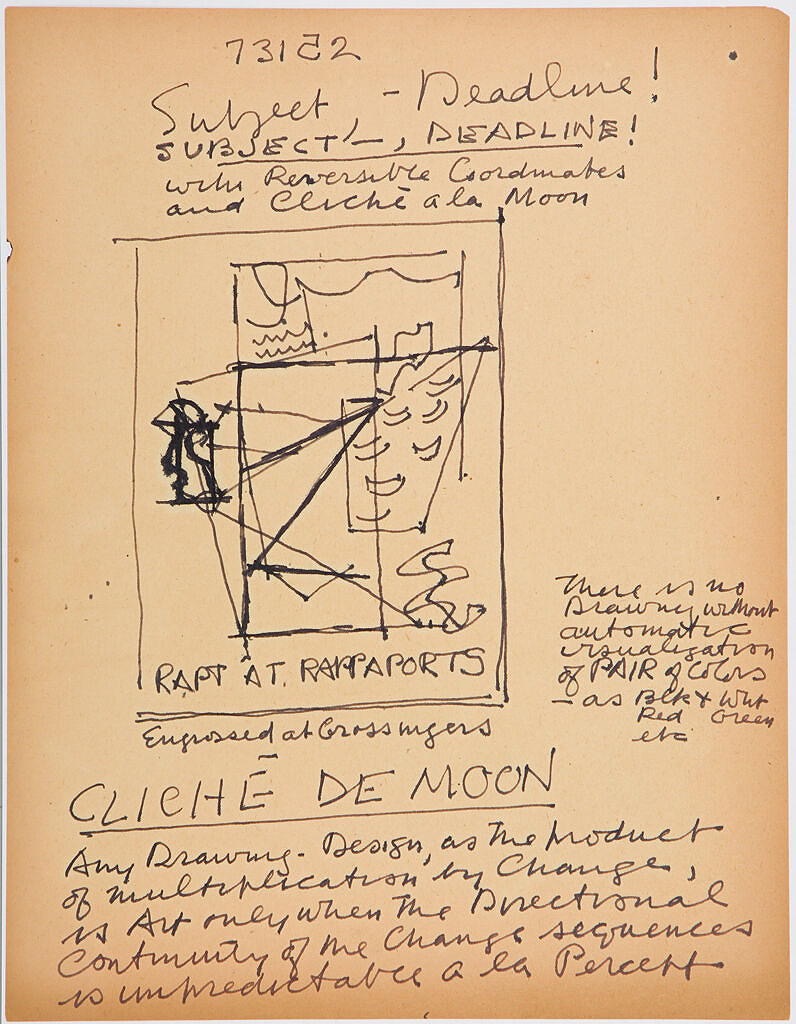Rapt

Stuart Davis: Study for “Rapt at Rappaport’s” (1952) 
Stuart Davis: Rapt at Rappaport's (1952)
"Publishing ain't whitewashing …"
Writers and editors long ago acknowledged that authors make lousy proofreaders and copyeditors because they're too involved with and invested in the object of their efforts. One would never dream of employing any craftsperson as their quality control inspector, for use demands a separate set of imperatives than fabrication ever does. The maker should fall under a thrall with his creations, ardor which properly disqualifies them from passing sound finishing judgments. While creating my latest manuscript, I harbored deep doubts about the product of my effort. Well into the first third of the project, I complained that I had not yet found the rhythm of it and openly wondered if the concept possessed any inherent rhythm within it. Only when I was more than halfway done did an underlying logic emerge. Then I became more protective than critical, more the father than the humble subcontractor.
A form of evolution governs the creation of a finished work. It must start as speculation and exist in distinctly grey areas long before finally revealing its palette to its author. Once those colors reveal, though, the writer properly becomes Rapt, privately astounded by his work and proud of his creation. Pride—that popular precursor to falls—quietly disqualifies its author. It hobbles his independent judgment, leaving him subservient to whatever he’s produced. He becomes more defender than improver, more steadfast champion of his status quo than the breakthrough creator. Any breakthrough the work retains likely emerges before the author's ardor and his Rapt response ruined his objectivity for good.
This ruin does come for good, for the good of both the author and his work. He's labored in isolation to produce an inherently social result, a contradiction only resolved by an opening up. Other eyes and different sensibilities must contribute to the finishing of whatever the author started. He's likely to feel protective of his baby and avoid sharing what he might sincerely believe would be prematurely. It might always be early enough for this break, for the underlying DNA of a work appears in even the earliest instances of it. The first chapter, even the first sentence. Still, it makes all the sense in the universe to delay this unveiling until very late when the potential for disruption could hardly be greater. Nothing disturbs Rapt attention like threatening information.
In practice, no proofreader or copyeditor worth their salt would ever think to utterly blow up an Author's ardor. The professional remains stealthy and careful, posing suggestions for the author's consideration, understanding that nobody readily absorbs even the healthiest criticism. If the work is crap, the universe will find ways to make the author aware of that. Still, such awareness better emerges from an author's nascent skepticism than from any know-it-better proofreader or copyeditor. The author's voice must survive whatever improvements might emerge as necessary during the final reviews before launch. The universe does not need another work power-washed clean, devoid of its author's tool marks and style. Some rough edges should properly persist for distribution to the masses. Publishing ain't whitewashing.
I noticed yesterday while listening to my manuscript that I have fallen deeply in love with it. I feel pride when I hear each story, amazed that I contributed in any way to creating it, much less that I was its sole author. My ardor runs deep, and I sense that I might be over-protective of it, too invested in it, now more hoarder than purveyor. It might seem too sacred to share. It might be too special, too unique for me to ever allow it out on the street. It could be my secret instead, too intimate of a self-portrait to share. The Publisher understands how to transform Narcissis's experience into a public commodity. Without that influence, we'd likely never see another manuscript published.
©2023 by David A. Schmaltz - all rights reserved


